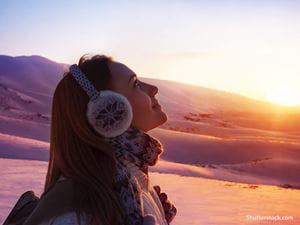
Winter is a three-month period of time that represents a pause in the activity of life. Great lakes, ponds, and streams freeze over; the earth grows hard and unreceptive. Tree sap stops flowing. Even the air becomes dense, slow to move, and heat stealing. Yet, not everything is as it appears to be!
The pervasive stillness and deep silence of winter are powers every bit as great as are the explosive forces of spring and summer, only different. After all, what is a glacier but a vast frozen river crawling its way through time? Both are forms of water whose unstoppable might can carve their way through solid rock! So, how can we channel this power of winter and use it to let go of whatever stands between us and the higher life we desire?
The better we understand this unique power of being passive—and how it serves as the secret consort of all things active—the more we grow in the faith we need to be wisely passive toward whatever fears remain in us about letting go of our lower nature. This is why, during the dark days of winter, we should take time each day—as often as possible—to quietly return to the living Light that dwells in the center of ourselves.
By gathering our attention in this way, and bringing the whole of ourselves into the heart of this interior stillness, we not only collect our own forces, as nature herself is doing, but much more: in this deliberate act of gathering ourselves—and for the conscious sense of quiet contentment we find within it—we are also being released from the false idea that the source of our strength and security can be found somewhere outside us.
The great French author, philosopher, and Nobel Prize winner, Albert Camus, knew the power of this truth now revealed. He also realized its liberating potential. In the following carefully chosen words, see how beautifully he tells us not to fear any season of life wherein we find ourselves feeling empty, alone, or without any Light in our life. He writes: “In the depth of winter, I finally learned that within me lay an invincible summer.”
Once we start to see, to know in our innermost heart, that life itself is already complete, we can let go of whatever—or whoever—would have us believe otherwise.
Old attachments and their long-standing aches are now seen for being what they have always been: appendages of days gone by, worthless to the higher self we have agreed to become and by whose stillness we realize this need for a wholly new valuation of our own soul.
Now is the season to die to discontent, to withdraw our consent to live with any thoughts or feelings that would convince us it’s necessary to live in conflict or confusion.
The winter season can be the most challenging in terms of learning to channel its powers to help us let go. But, we may also have this timeless assurance: we are really created to enter into the perfect stillness from which we came. And for our return home—by entering into the bare infinity that is the center of our true self—we arrive where we have always longed to be … without ever having had to set out. Here we make this last, glad discovery: the task of letting go, of separating ourselves from who and what we need no longer be, has already been done for us.
There may be doubts, but in the quiet of winter, we can more clearly see that uncertainty is unwanted because it feels so unpleasant each time it appears in our lives. Can we be awake enough to see the positively bright side of this revelation? For as surely as darkness must come before the break of a new day, so it’s true: before the new light of higher understanding can have its gentle dawn in us – we must see that we have come to the end of what we know.
Rest assured, we are created with the tools it takes to master our own lives. But self-mastery remains the ultimate mystery until that day dawns when—weary of struggling to overcome what we blame for our conflicted selves—we let go and enter into the untamed country of ourselves by becoming completely still. And by this stillness, we tame its wildness; and through this stillness we are given dominion over all the kingdoms of heaven and earth.
The real test of our love for the light of truth is not when life is bright, but is best measured when nothing goes right. For the love of light in high summer is easy; but to remember it in the dark of winter – to struggle to recollect ourselves into its sheltering glow – demands a conscious choice. Are we to be the one who feels forsaken by the light we profess to love? Or will we be the one who never forgets that true love never dies and that our true self cannot be made a captive of any dark condition any more than a sunbeam can be caught in a bottle.
Remember, regardless of how we may feel in any given moment, real life can present no task before us for which we are “inadequate.” Yes, we may be unprepared at its outset—just as a leaf-bare late autumn tree can’t know, in advance, the weight of a heavy winter snowfall until its branches bend and maybe even break beneath it. But no tree is its limbs, and neither are we made less for what we can’t do or carry when first challenged by something that seems too great for us to handle.
Our truest strength lies in our ability to realize that whatever our present weakness may be, it is as temporary as the turn of the seasons, provided we are willing to persist, to wade into what seems greater than we are, and to test this truth time and time again.

